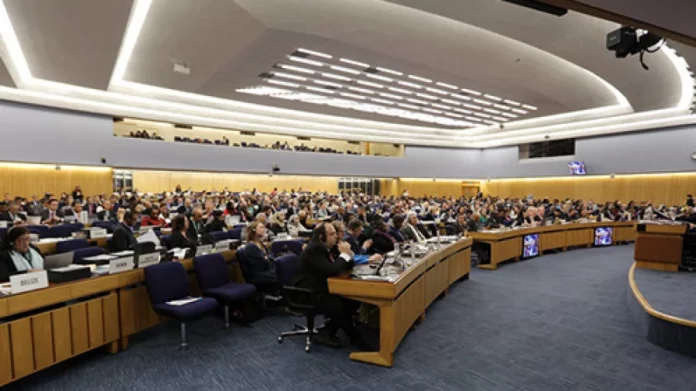By Nurul Islam Hasib/Dhaka Tribune
December 7:
Those elections include the position of Regional Director of the WHO Southeast Asia Region, a member of the International Maritime Organization (IMO) Council, a Member of the UNESCO Executive Board, and an election at the Common Fund for Commodities (CFC).
Besides, Bangladesh became an executive member of the Organization for the Prohibition of Chemical Weapons (OPCW). High Commissioner to the UK Saida Muna Tasneem was elected as the First Vice President of the 33rd Assembly of the IMO unanimously.
These election victories came at a time when Western countries, particularly the US, have focused on Bangladesh regarding democracy and human rights. Washington announced a visa restriction policy ahead of the January 7 general elections to ensure free and fair elections.
The European Union also expressed concern in November over the situation and urged everyone to refrain from violence and find peaceful ways to conduct participatory elections.
The opposition political parties tried to create a public perception that the government was being isolated from the international community as preparations for the general election were underway.
Against such a background, what do these election victories mean for Bangladesh? Dhaka Tribune asked Dr. Lailufar Yasmin, Professor at the Department of International Relations of the University of Dhaka.
“This indicates that Bangladesh identifies and prioritizes international forums according to its foreign policy goals and objectives. It also shows that we are moving into a new era of adopting a proactive foreign policy as well as taking on the role of an agenda-setter,” she said.
“It demonstrates that we are preparing ourselves to emerge as a Middle Power. Being elected in these forums is recognition of our hard work; our efforts are being recognized and noticed by the international community,” she added.
Dr. Yasmin does not think that Bangladesh was ever isolated.
“I do not think that Bangladesh was ever isolated. Also, there is nothing called a unified West. Because of the growing geopolitical significance of Bangladesh, it is not possible to shun Bangladesh at all.”
IMO
IMO is the only UN specialized body that regulates global shipping standards affecting ship-operating flag states, seafarers, maritime safety security, and marine pollution.
Bangladesh has been elected as a member of the IMO Council for the term 2024-2025 in elections held in London on December 1.
Bangladesh secured 128 votes out of 166 member states present and voting. It was a highly competitive election as 25 countries vied for 20 posts.
During its term as a Council member for the period 2024-25, Bangladesh will negotiate its international trade (90% of which is operated by the sea), its maritime ports’ transition into green, digitized, and smarter ports, its compliance with the Hong Kong Convention on ship recycling, and the use of greener fuels by Bangladesh vessels, among other critically important issues for Bangladesh’s shipping and maritime industry.
CFC
Ambassador Sheikh Mohammed Belal has been re-elected Managing Director of the Common Fund for Commodities (CFC). He was re-elected for a four-year term with 68.01 percent of the votes at the 35th Annual Meeting of the Governing Council on November 22 in The Hague.
In the 34 years of CFC history, Bangladesh’s candidate Ambassador Belal is the first Managing Director elected with more than two-thirds of the votes.
“This historic victory was possible because of unprecedented support for Bangladesh’s candidature from all major regional groups,” Ambassador Belal said in a reaction after the victory.
He was first elected Managing Director of the CFC on December 4, 2019, and officially assumed his post on April 8, 2020.
UNESCO
Bangladesh has been elected a member of the executive board of UNESCO for the 2023-2027 term. Of the 184 members, 181 took part in the election at the UN agency’s headquarters in Paris on November 15. Bangladesh received 144 votes.
“Bangladesh’s victory at UNESCO is the result of our deep engagement and diplomatic strides at the international fora under the leadership of Prime Minister Sheikh Hasina,” Education Minister Dr. Dipu Moni, who led the Bangladesh delegation at the UNESCO General Conference, said after the victory.
WHO Election
Saima Wazed, daughter of Prime Minister Sheikh Hasina and an internationally renowned mental health expert, won the election for the World Health Organization’s regional director for Southeast Asia.
Bangladesh, Bhutan, the Democratic People’s Republic of Korea (DPRK), India, Indonesia, Maldives, Nepal, Sri Lanka, Thailand, and Timor-Leste took part in the voting in New Delhi on November 1.
Saima Wazed secured eight votes. The other candidate, Dr. Shambhu Prasad Acharya, nominated by Nepal, received two votes.
She will take office on February 1 for a five-year term and be eligible for reappointment once.
With that, Saima Wazed will be the first Bangladeshi to hold the post created in 1948 as part of WHO’s regional divisions.
Unanimous Victory
Besides, Bangladesh High Commissioner to the UK Saida Muna Tasneem was unanimously elected First Vice President of the 33rd Assembly of the International Maritime Organization (IMO) in London on November 27.
This is the first time Bangladesh and one of its senior diplomats have ever been voted to one of the highest positions of the prestigious IMO General Assembly comprising 175 member states. Bangladesh also became an executive member of the Organization for the Prohibition of Chemical Weapons (OPCW) unanimously at a meeting on November 29 for the next two years.
END





